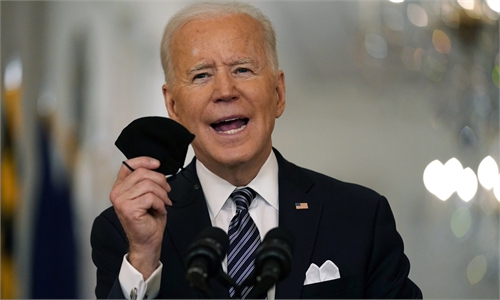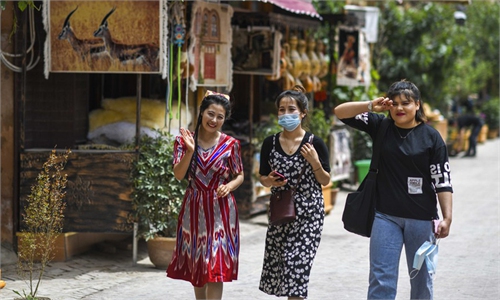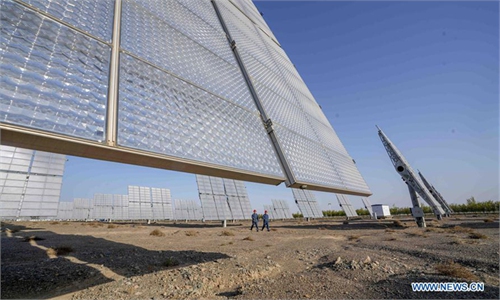
Illustration: Chen Xia/GT
The Biden administration updated on Tuesday its Xinjiang supply chain business advisory. It threatens American enterprises with excuses such as the "use of forced labor" and "human rights abuses," saying that "businesses and individuals that do not exit supply chains, ventures, and/or investments connected to Xinjiang could run a high risk of violating US law."All of the US' recent moves against China's Xinjiang follow an assembly line-like pattern.
First, Washington picks an industry in which it takes China as a threat to US industries. Second, it uses trumped-up charges, like threatening data security and violating human rights. Then, it funds media and social groups to launch a propaganda war against it. And finally, it takes advantage of groups it funds to justify its unreasonable, confrontational policies against China.
The US forcibly linked so-called "forced labor" and "human rights abuses" with Xinjiang's cotton and photovoltaic industries, so as to squeeze the living space of Chinese enterprises and make excess profits for the US.
The US had dominated the global cotton market for years, but its global share is now much smaller than that in 2004. As for photovoltaic power, there were 75 major solar parts factories in the US, most of which have been closed, according to Bloomberg.
US politicians blame China for that, but they will never talk about the real, complicated factors - some of which are attributed to the US itself - behind those changes of numbers. US' inconsistent and piecemeal policy is one among the factors. As long as they can convince people there is a need to counter and contain China, it is enough for them.
China's high-tech giant Huawei is another victim of US dirty tricks. The US accuses Huawei of engaging in data espionage, but it has never provided any evidence. In the meantime, Washington has been lobbying allies to join its anti-Huawei campaign, while having media hype its accusations, distorting and demonizing the image of Huawei.
Cotton is a pillar industry in Xinjiang, and the region is a major source of polysilicon, used to make solar panels. It has become a thorn in the side of anti-China forces in the US-led West.
In the first place, they portrayed Xinjiang as a place where human rights are frequently violated to provide a reasonable context for their "forced labor" accusation. They upheld the banner of human rights to slander China's governance in Xinjiang and regional development in a bid to crack down on local industries. Next, they referred to administrative methods to legitimatize their vicious intent and threatened American businesses and individuals to stay away from Xinjiang in the name of law.
If the US succeeds in its Xinjiang attempts, it will be targeting China's other key industries that it views as threats, trying to strip them from the global industrial chain. This will trigger a domino effect, Li Haidong, a professor at the Institute of International Relations of China Foreign Affairs University, told the Global Times on Wednesday. "This is a very sinister and vicious move. We must not compromise, because it involves China's core interests of national security and development."
In the face of US' intention to create unemployment and poverty, disrupt Xinjiang, and contain China's development, "we should expose US malice to the world, fully expose its ambition, and make clear that it goes against the people's will to destroy the global economy and market rules through its political manipulation," Li said.
As China has issued the Anti-Foreign Sanctions Law, countermeasures on the unjustified extraterritorial application of foreign laws, and a list of unreliable entities, the country has formed its own toolbox against sanctions, interference and long-arm jurisdiction.
If politicians bring businesses into trouble in both China and the US for their own political gain, these capital-backed politicians will actually shoot themselves in the foot.



